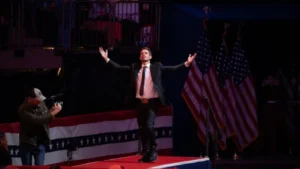Criticism follows comedian’s remark at Trump rally calling Puerto Rico an ‘island of garbage.
During a recent Donald Trump rally, comedian Tony Hinchcliffe sparked outrage by referring to Puerto Rico as a “floating island of garbage.” This comment drew immediate backlash from both Republican and Democratic leaders, prompting accusations of racism. Hinchcliffe, known for his podcast *Kill Tony*, delivered his routine at Madison Square Garden in New York, where his set included several offensive jokes based on racist stereotypes.
The reaction to his remarks was swift, especially from Republican figures in Florida, which has a large Puerto Rican community. U.S. Congresswoman Maria Elvira Salazar expressed her disgust, labeling the comment as “racist” and asserting that it does not reflect the values of the Republican Party. She emphasized the contributions of Puerto Ricans to the U.S. military, underscoring their loyalty and service to the nation.
Senator Rick Scott also condemned Hinchcliffe’s joke, stating that it “bombed for a reason,” and reinforcing that it was neither humorous nor true. He praised Puerto Ricans as “amazing people and amazing Americans,” demonstrating a clear effort from Republican officials to distance themselves from Hinchcliffe’s remarks and defend the dignity of Puerto Ricans.
Puerto Rico’s unique status as a U.S. territory complicates discussions about the island, especially when they involve derogatory comments. Residents cannot vote in U.S. presidential elections, although many in the diaspora do, making discussions about their identity and representation particularly sensitive.
In addition to his disparaging comments about Puerto Rico, Hinchcliffe made other offensive remarks, suggesting that Latinos “loved making babies,” and invoking stereotypes about Black people and watermelons. These comments elicited groans from the audience. He also made a derogatory reference to Palestinians, implying they were “rock-throwers,” while suggesting that Jewish people would not spend money, tapping into harmful antisemitic stereotypes.
Reports from CBS, a partner of the BBC, revealed that although the Trump campaign had vetted Hinchcliffe’s initial list of jokes, the controversial comments regarding Puerto Rico and other groups were improvised. The campaign reportedly removed two profane jokes but allowed the more inflammatory remarks to stand.
As the controversy unfolded, Trump himself has remained silent on the issue, even as calls for an apology emerged from various figures, including the archbishop of Puerto Rico and the head of the island’s Republican Party. This highlights the significant backlash and the demand for accountability in response to Hinchcliffe’s comments. The situation reflects the complexities of political rhetoric and its effects, particularly at the intersection of race, identity, and representation.
Additionally, the backlash coincided with the endorsement of Kamala Harris for president by prominent Puerto Rican rapper Bad Bunny, further intensifying the political climate surrounding the remarks. This incident underscores the heightened sensitivity around discussions of race and identity, especially in the context of U.S. politics.
In the wake of the backlash, Mr. Hinchcliffe defended his material, asserting, “These people have no sense of humor,” in a post on X in response to criticism from Democratic lawmakers like Alexandria Ocasio-Cortez and Tim Walz. He emphasized, “I love Puerto Rico and vacation there. I made fun of everyone… watch the whole set,” suggesting that his intention was not malicious.
Ocasio-Cortez fired back, stating, “You don’t ‘love Puerto Rico.’ You like drinking piña coladas. There’s a difference.” She described Hinchcliffe’s comments as “super upsetting,” especially since her family hails from Puerto Rico, highlighting the personal impact of his remarks.
The evening’s other speakers also stirred controversy with their statements. David Rem, a childhood friend of Trump, labeled Harris “the devil” and “the antichrist,” while Trump’s former attorney Rudy Giuliani made a false claim that the Democratic candidate was “on the side of the terrorists” in the context of the Israeli-Palestinian conflict.
Despite the focus on his guest speakers’ contentious remarks, Trump took the opportunity to announce a plan for tax credits aimed at individuals caring for parents or loved ones, stating, “It’s about time that they were recognized.” He also reiterated his intentions regarding immigration, advocating for mass deportations of undocumented migrants. He described his goal to “rescue” areas he claimed had been “invaded and conquered” by “vicious and bloodthirsty criminals,” reinforcing his hardline stance on immigration.
Earlier on Sunday, Kamala Harris unveiled a series of policies aimed at supporting Puerto Rico, receiving endorsements from notable figures such as Jennifer Lopez and Bad Bunny. This marks a significant moment, as numerous other high-profile celebrities have also expressed their support for her campaign.
Bad Bunny shared multiple videos of Harris discussing her initiatives for the island and critiquing Donald Trump’s handling of Hurricane Maria, which claimed nearly 3,000 lives in 2017. A source close to Bad Bunny confirmed to CBS that his posts constituted an endorsement of Harris, breaking his usual practice of remaining silent on national political matters.
In recent years, Puerto Rico has experienced a significant exodus, with many residents relocating to the mainland U.S., particularly to states like Florida, North Carolina, Georgia, and Pennsylvania. Puerto Ricans have become the second largest Latino subgroup in these areas, highlighting their growing political influence.
While Bad Bunny’s remarks seemed to be pre-planned and did not address Hinchcliffe’s controversial comments, fellow Puerto Rican singer Ricky Martin did speak out. He urged his fans to recognize “this is what they think of us” and encouraged them to vote for Harris.
According to the Pew Research Center, there are approximately 36 million Hispanic voters eligible to participate in elections this year. Historically, Hispanic voters have been a crucial component of the Democratic coalition, although Republicans have been gradually gaining ground in this demographic.
Madison Square Garden, located near the center of New York City, is one of the most iconic venues globally, with a seating capacity of approximately 20,000. This venue holds particular significance for Trump, as it is in his hometown and the site of a historic criminal conviction he received earlier this year.
Despite its prominence, some view New York as an unusual choice for the final week of campaigning, given that it is a solid blue state and not likely to play a decisive role in the presidential race.
Who is Tony Hinchcliffe?

Tony Hinchcliffe is a stand-up comedian based in Austin, Texas, renowned for his podcast Kill Tony, which gives aspiring comedians the chance to audition for 60 seconds in front of Hinchcliffe and his co-host, Brian Redban. The podcast has gained a substantial following, boasting 1.89 million subscribers on YouTube.
Hinchcliffe grew up in Youngstown, Ohio, where he embraced his role as “the class clown.” He began his comedy career working with Joe Rogan and writing jokes for celebrities during Comedy Central Roasts. However, this isn’t the first time his comments have drawn controversy. In 2021, he faced backlash for using a racial slur while referring to American-Chinese comedian Peng Deng during a performance, and he refused to apologize for it. When interviewed by Variety, Hinchcliffe stated, “I knew that what I had done was not wrong,” adding that he believes comedians should never apologize for their jokes.
Earlier this year, Hinchcliffe also participated in a comedy roast for former NFL star Tom Brady on Netflix, further cementing his presence in the comedy world. His career has been marked by a mix of acclaim and controversy, making him a notable figure in contemporary comedy.
Additional reporting by James FitzGerald and Ana Faguy.




